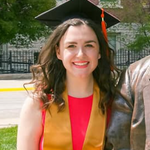The Impact of Racism on Urban Belowground Biodiversity
PI: Kathryn Atherton, PhD Student, Bioinformatics; BU URBAN Program
Co-PI: Jennifer M. Bhatnagar, PhD, Assistant Professor, Department of Biology, College of Arts & Sciences

Read a Q&A with Kathryn Atherton and watch a spotlight video.
Healthy soils are a key measure of urban green space quality. In particular, soil microbial diversity is a crucial ecosystem service provided by urban green spaces, providing nutrients to urban plants, sequestering carbon in soil, and suppressing pathogens. Urbanization can reduce soil microbial diversity and increase the abundance of human pathogens, primarily due to degradation of soil quality in spaces experiencing high rates of disturbance. However, soil disturbances are not distributed equally across urban neighborhoods, with disturbances likely highest for racial and ethnic minority communities. Racist policies implemented in city planning, like forced residential segregation through redlining, have led to more fragmentation, impervious surface area, and industry in today’s neighborhoods with higher racial and ethnic minorities, all of which increase disturbance and lower soil quality by increasing pollution. Nevertheless, the role of historical racism in structuring today’s soil microbial community diversity and composition in urban green spaces is unknown. This issue is important to address, because interactions with more biodiverse soil microbiomes have been associated with greater immune protection against chronic diseases, such as asthma, which particularly affect racial and ethnic minority communities. As such, some have argued that equitable access to diverse microbial communities, similar to access to clean water and air, should be a human right. Atherton and Bhatnagar aim to address this issue by investigating how historical racial disparities in urban space development interact with environmental factors to explain variation in soil microbiome diversity and composition across Boston green spaces. Their goal is to equip the residents and policymakers of Boston with an understanding of how location within the city (place) and type of urban green space that surrounds it (space) determines access to an invisible, basic human right living beneath our feet.

In this study, Atherton and Bhatnagar will conduct a city-wide survey of soil microbiome diversity and composition in urban green spaces of Boston and how it varies across neighborhoods due to environmental factors shaped by the legacies of racist policies. A single pinch of soil often contains several hundred different species of bacteria and fungi, so their study will leverage advances in microbial DNA sequencing technology to identify all of the taxa within 81 green spaces around Boston in communities of varying racial and ethnic demographics. They will pair microbial community data with existing data on average temperatures, tree density and diversity, and air and soil pollution that are available for the city of Boston. This will be the first study to tease apart the role of multiple environmental factors in controlling urban soil microbiome composition and the social factors that shape them.
See more of our 2021 Early Stage Urban Research Award recipients